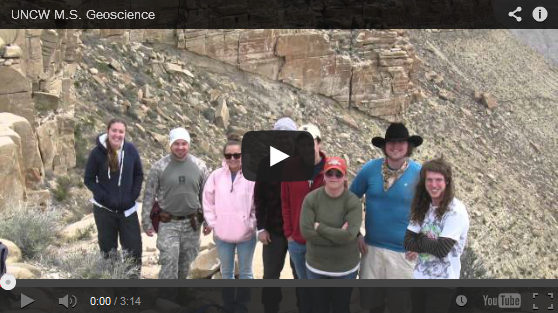| |
Jan 29, 2026
|
|
|
|
|
2019-2020 Graduate Catalogue Archived Catalogue
Geoscience - M.S.
|
|
 Return to: Graduate Programs Return to: Graduate Programs
Graduate Coordinator: Dr. Chad Lane 

The Department of Earth and Ocean Sciences at the University of North Carolina Wilmington offers a program of study leading to the Master of Science (M.S.) degree in geoscience. The primary goal of the program is the development of professionals capable of conducting research in the geosciences through broadly based study of modern Earth and ocean processes and their ancient analogs.
The program includes a thesis and non-thesis option, both of which provide a foundation for advanced study or employment in the geological, geospatial technology, environmental fields, mineral and energy industries, and government agencies. For example, completion of the non-thesis option with a geology concentration assists students toward professional licensure in geology. In addition, the thesis option is designed to prepare students for advanced study leading to the doctoral degree.
Specific goals of the program are to provide advanced research and educational opportunities in the geosciences, and to prepare geoscientists for solving contemporary problems in Earth, ocean and environmental science. Specific objectives are: 1) to develop research competence in the geosciences; 2) to develop professional competence in the assessment of water, energy and mineral resource potentials through the integrated analysis of geological and geographical data using advanced technologies; 3) to develop a level of research competence in the geosciences that encourages continued effort towards an advanced (e.g., doctoral) degree or professional licensure; and, 4) to provide the scientific community with meaningful geologic, geographic, and oceanographic data.
|
Admission Requirements
Applicants seeking admission to the graduate program in geoscience: - Should have a strong overall academic record with a “B” or better average on all course work prerequisite to geoscience, and satisfactory scores on the Graduate Record Examination (GRE).
- Must have a bachelor’s degree from a regionally accredited college or university in a discipline appropriate to advanced study in the geosciences.
- Upon entrance into the master’s program, the student’s advisor may identify deficiencies and recommend remedies. All deficiencies must be removed before a student is accepted as a candidate for the degree.
Applicants are required to submit the following to the Graduate School: - An online application for graduate admission; including the statement of interest.
- Official transcripts of all college work (undergraduate and graduate).
- Official scores on the Graduate Record Examination (verbal, quantitative, analytical writing)
- Three recommendations by individuals in professionally relevant fields
- Application and supplemental documents must be submitted by the published deadline.
Transfer Credit
A maximum of six credit hours of graduate credit may be transferred from another regionally accredited institution. All transfer credit must be approved by the department or program. Grades earned on transfer work must be equivalent to “B” or better. Degree Requirements
The MS Geoscience program requires satisfactory completion of core requirements and a concentration in either: 1) geology, 2) geospatial science or 3) earth processes and global change. Students may pursue the thesis option (30 credit hours) in any concentration or non-thesis option (33 credit hours) in the geology or geospatial science concentrations. Students may not take more than 6 credit hours of GEO 591 - Directed Independent Study . A minimum of 24 graduate credit hours must be taken at UNCW. Thesis Option (30 credit hours)
- Each student must write a thesis prospectus that is approved and signed by the student’s advisor and thesis committee.
- Each student must successfully pass a comprehensive oral examination.
- Each student is required to complete a minimum of three, but no more than six credit hours of Thesis (GEO 599 ).
- Each student must complete, present and defend a thesis, based on original research, acceptable to the committee, prior to graduation. The thesis presentation is open to the public.
Thesis Concentration Requirements
Geology Concentration- Thesis Option
In addition to completing the requirements listed above for the thesis option, students must complete: - 15 graduate credit hours of geology courses (GLY prefix)
- Additional graduate credit hours of GEO, GGY, GLY or other courses approved by the student’s advisor and the graduate coordinator.
Geospatial Science Concentration- Thesis Option
In addition to completing the requirements listed above for the thesis option, students must complete: Earth Processes and Global Change Concentration- Thesis Option
In addition to completing the requirements listed above for the thesis option, students must complete: - 18 graduate credit hours of GEO, GGY, or GLY courses
- Additional graduate credit hours approved by the student’s advisor and the graduate coordinator
Non-Thesis Option (33 credit hours)
- Each student must complete either GEO 597 (Final Project) or GEO 598 (Internship).
- An additional three credits of internship may be applied to the degree with approval of the student’s advisor and Graduate Coordinator.
- Each student must pass a written comprehensive examination after the successful completion of all required coursework with the exception of GEO 597 and GEO 598 .
- Each student must prepare and present a degree portfolio documenting the completion of either GEO 597 or GEO 598 .
Non-Thesis Concentration Requirements
Geology Concentration- Non-Thesis Option
In addition to completing the requirements for the non-thesis option listed above, students must complete: Geospatial Science Concentration- Non-Thesis Option
In addition to completing the requirements for the non-thesis option listed above, students must complete: |
 Return to: Graduate Programs Return to: Graduate Programs
|
|